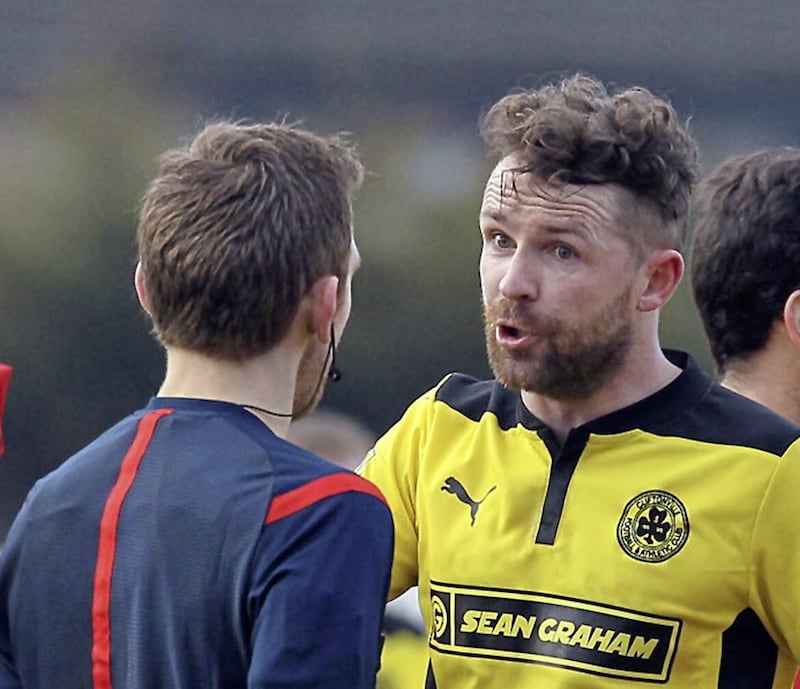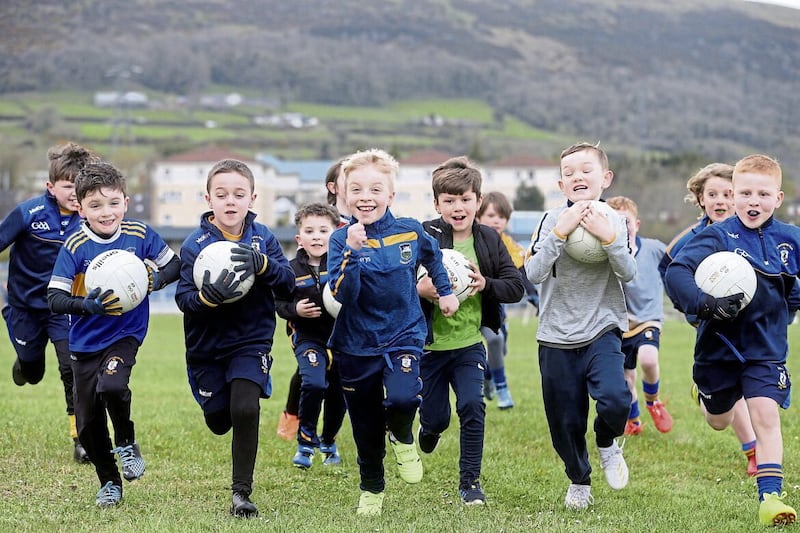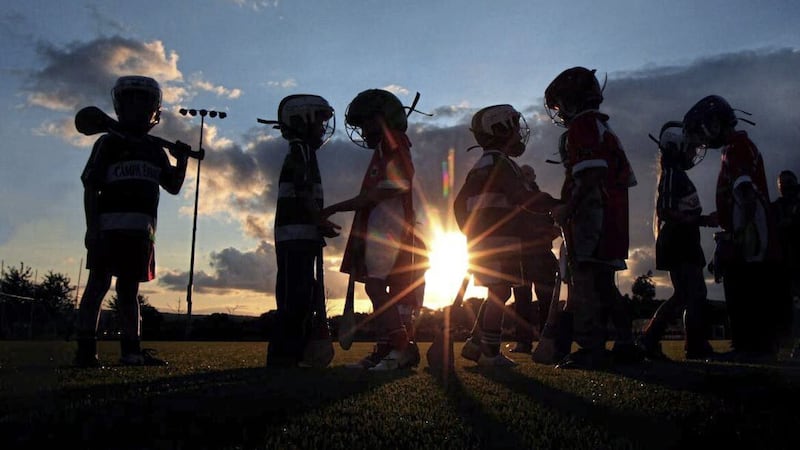IT depends on who or what you read on social media after The Irish News revealed on Tuesday night that the GAA was set to clamp down on those providing any form of competition for players under the age of 12 – but it’s the kind of debate that won't go away easily.
Some cried it was the snowflake generation striking again. Others insisted it was the GAA trying to put manners on underage coaches up and down the country who were perhaps losing the run of themselves and wanting to win at all costs.
This was Croke Park reminding them that player development isn’t to be messed with just because there’s a gleaming trophy and a set of medals sitting at the side of a pitch.
So, what do tournament organisers do now? Abide by Association rules and preach to the kids playing Gaelic Games under the age of 12 that it’s the taking part that counts?
Or do they hide the trophy in the bushes and slip it into the car boot of the winning coach's when all the parents have packed their empty-handed kids away?
Indeed, is this the GAA green-housing mediocrity and stalling the pursuit of sporting excellence? Don’t keep scores never mind publish them on the club’s Facebook page – and, remember, knock-out matches are also banned.
And if you want to host a blitz, make an application to the Games Development Manager.
On the surface, it all sounds a bit over the top – but the GAA is only reiterating the rules that already govern games for children under the age of 12.
The newsworthy element to the GAA’s strongly worded memo to its units, seen by The Irish News, is that they feel compelled to issue it in the first place.
Read More
- Underage blitzes have no place in the GAA and referees have to earn respect says GAA President Larry McCarthy
- Kicking Out: Changing age grades will make retaining players even harder
- Kicking Out: Latest age grade report does nothing for clubs
Player development has always been a core principle of the GAA’s, and there is a sense that blitzes and festivals are, at least in some instances, becoming too competitive and trophy laden.
Former Derry footballer and now underage football coach Paul McFlynn has a clear eye on both sides of the debate.
“I’m not saying that I am right and that’s the beauty about life - there are different perspectives,” McFlynn said.
“Some people are saying the GAA is taking the competitiveness out of it – I don’t think they are because, to a large extent, children are naturally competitive anyway.
“I think the problem is the desire for winning becomes too great. I’ve witnessed it on many occasions.
“We’d play Go Games (which prioritises participation among children and promotes equal game-time) on Friday night and the exact same teams are in a blitz on a Sunday and it is like day and night in terms of the atmosphere and the philosophy because there is a trophy or a medal at stake.
“I don’t think the lure of a medal or a cup is the same for the children; it becomes more significant for the coaches, and I’m not meaning to paint everybody with the same brush because there are people in clubs who do it the right way and promote the right philosophy.”
McFlynn added: “At the Go-Games everybody gets playing, kids come on and off and when their so-called star players are being taken off there is not the same worry from the coaches because there is nothing at stake. But when it comes to a Sunday and there’s a chance of beating your local rivals and getting one up on them – because, in some cases, they imagine that this is career-defining for a lot of the kids of the club when it’s not.”
What complicates the picture even more – if it wasn’t messy enough - is the future of hugely popular primary school competitions such as the Castle Cup in St Patrick’s, Maghera.
And what happens to memorial tournaments that are important and tangible ways by clubs and schools of keeping the memory of lost members alive?
McFlynn acknowledges that the GAA faces stiff challenges to keep Gaelic Games at U12 and below non-competitive – but understands why Croke Park issued the threat of strong sanctions.
“I’m not against competition at all,” McFlynn stressed. “We’re naturally competitive. It’s part of life where there are ups and downs and we always talk about building resilience, taking set-backs and dusting ourselves down…
“But I see things happening at blitzes that should never happen – people roaring and shouting at referees, using inappropriate language in front of kids and all of that. And you see kids refusing to shake hands with the other team because they’re so upset and annoyed.”
Marc Smyth won back-to-back Irish Premiership titles with Cliftonville and a host of other accolades during his successful playing days at Solitude.
Nowadays, he is head of the north Belfast club’s very successful youth academy and oversees the development of over 300 players from four-years-old right through to the first team.
He believes the GAA’s insistence of non-competitive games for kids up to U12 is self-defeating and “strips away the natural instinct” of a young player wanting to be the best version of themselves.
“I think you have to look at this from both sides,” said Smyth.
“But it’s this idea where everyone can be treated the same, that there are no winners or losers is nonsense. I mean, that’s just crazy.
“From U8s up we are developing kids but we always want to win in what we do. I look at this through the kids’ eyes – we finish our training sessions with matches and once those games are over, the kids will come over and tell you who won. Their natural instinct is to be competitive.
“The natural instinct of any person is to be the best that they can be, they want to win – and I’ll never try and take that out of a child.”
Smyth added: “The best players will always rise to the top and there will be a natural place for those who don’t. But we have a responsibility to those players who want to be elite to create a competitive environment for them to thrive. So, rather than take that away from someone, I think we should embrace it.”

Simon Johnston helps coach the 2011/12 girls at neighbouring St Malachy’s OB Youth FC. Their top stream squad has just completed a remarkable league and cup double in the South Belfast Youth League, going through the season unbeaten.
With so many kids under the age of 12 trying different sports in the city, Johnston feels, is potentially problematic for the GAA.
“There are pros and cons in this debate. There are lots of kids who play both soccer and Gaelic. So, you have underage players being placed into a competitive environment in soccer but a non-competitive environment in Gaelic.
“The kid doesn’t understand why he’s competitive in soccer but not in GAA. But the kids will make it competitive because that’s the way they are. It’s the same at gymnastics and swimming. A friend of mine has his child swimming three times a week and they go to galas at the weekend to compete, so the GAA not making it competitive from U12 down maybe puts them out on a bit of a limb.
“Even before you get to U12, the competitiveness already exists, irrespective of the organisation’s stance or belief.
“In every age group at every club you have teams with different levels of ability and with that you will also have kids with high levels of ability, kids who are excelling in their age group.
“They need to be tested. Now, that won’t work for all because there are some who won’t be up to that standard but then those kids are placed into development programmes that suits their ability.
“You’d imagine those with high levels of ability are the ones who are likely to stay in the sport longer and will want to be challenged and aim for things.”
Kevin Logan coaches O’Donovan Rossa’s U11s both in football and hurling. He feels the GAA are perhaps using a “hammer to crack a nut” with the latest missive to units.
Logan feels that player development and tournaments can easily co-exist for players under the age of 12.
“It’s about developing players,” Logan said. “We have a regular Go-Games schedule and they are all played in the right spirit; people make adjustments to their team: if you’re winning too much, you’d move people around and the same with the other team.
“Nobody tries to put the foot on anybody’s throat – we’re all developing players, week on week.
“Then, in the summer, there are tournaments. Everybody loves the tournaments. It’s not like we’re playing tournaments every single week.
“I sometimes wonder are other counties maybe more competitive. I think the GAA are using a sledgehammer to crack a nut here. We need competition.
“But I think what the GAA is trying to do is protect us from the way soccer went.
“In soccer, they all know the score, I’ve seen kids losing matches on penalty shoot-outs. I’ve seen parents’ groups talking about goal difference and all that sort of stuff. The GAA is a long way from that.”
Logan and his fellow coaches at the west Belfast club face another unintended consequence of the GAA’s recent memo in that half their squad will be P7 and the other half first year come September.
“The first years will be playing Belfast Cup and Ulster Colleges and on a full-sized pitch in front of crowds, playing to win, but when they come to play with their club they’ll be playing Go-Games.
“And as soon as you come out of U12s, you go into the biggest tournament you can imagine – regional and potentially All-Ireland Féile – with no experience of winning and losing.”
Logan will take two teams to the St Paul’s Festival of football this weekend. There are no A or B teams – just two sides with an even spread of good players in each.
“At the end of the day, our job is to make senior players – not to win tournaments at U12s,” Logan added.
“We are trying to keep the kids playing the game for as long as possible and hope they play senior for the club one day.”
McFlynn is a passionate believer in kids finding their stride at different times of their development.
“Who is to say the so-called ‘less developed’ kids won’t catch up? It takes bravery and courage for a coach to see the bigger picture – ‘So what if we lose this semi-final as we’re giving game-time to every kid’. How do they get better if they spend a lot of their time on the bench?”









